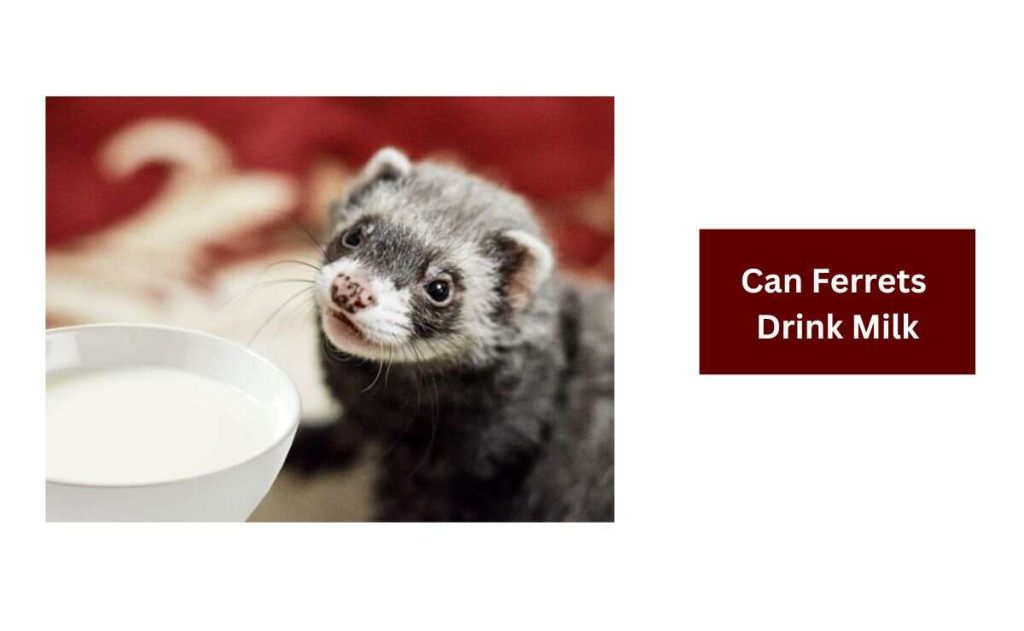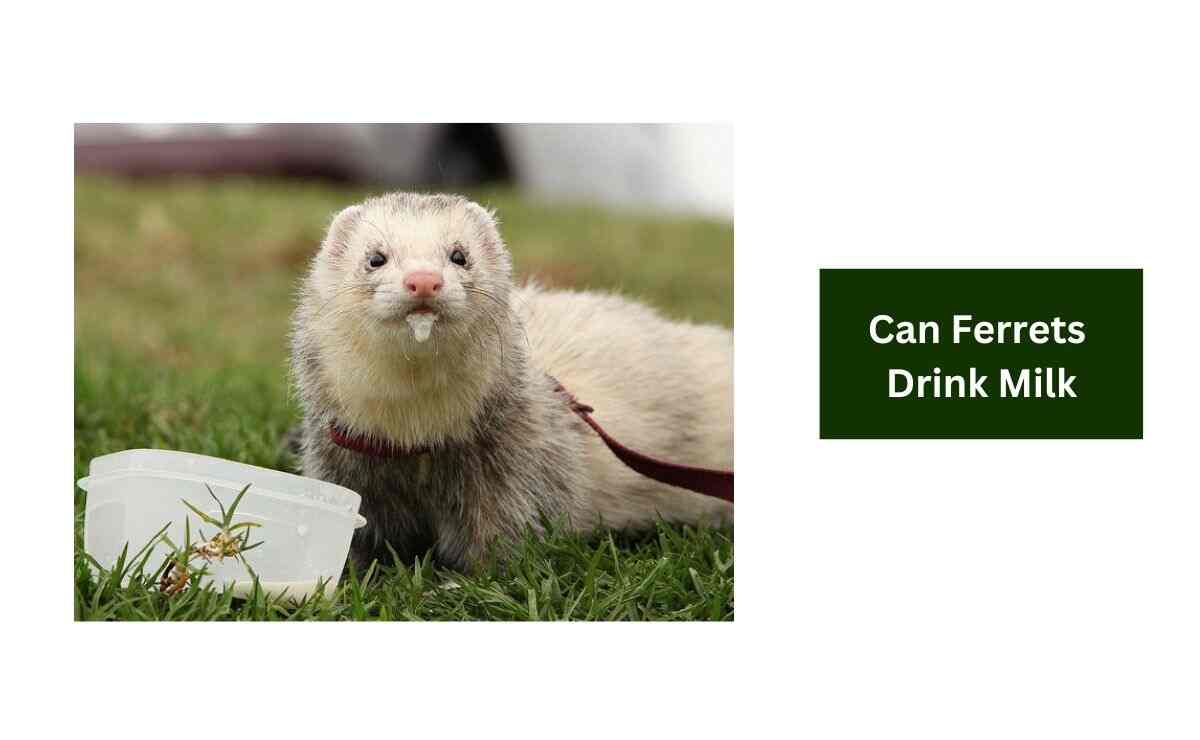Milk is full of nutrients and many ferret owners would like to provide it to their pets. But can ferrets drink milk? Is it safe?
Well, ferrets are strictly carnivorous and need animal protein to stay healthy. Though ferrets can consume small amounts of milk, you should not provide it to your pets. Because milk contains lactose and ferrets are intolerant. So if they consume cow or goat milk, they may suffer from stomach aches or other health issues.
However, ferrets love to eat milk and other dairy products. If you really want to provide milk, then give them a specialized solution that is free from lactose.
Can Ferrets Drink Milk?

Ferrets are quite fond of milk, but it’s essential to understand that it’s not suitable for them. While they enjoy a taste of it, too much milk can lead to problems. Ferrets are carnivorous creatures, and their bodies aren’t well-equipped to handle lactose, the sugar found in milk.
Ferrets are lactose intolerant, which means they can’t digest lactose effectively. When lactose-intolerant animals like ferrets consume milk, the lactose hangs around in their gut, causing trouble.
Bacteria take advantage of this undigested sugar, leading to issues like diarrhea, bloating, and upset stomach. Even a single spoon of milk can cause various issues.
Some may think that giving goat milk is a solution, but it’s not much better than cow’s milk as it has similar lactose content. Goat milk has easier-to-digest fat molecules, but it doesn’t solve the lactose problem.
Even if a small amount of milk won’t harm your ferret too much, it’s not a treat you should offer. Feeding your ferret milk, even occasionally, is not responsible for pet care. As much as your ferret may beg for it, it’s essential to prioritize their health over their cravings.
Can Ferret Kits Drink Milk?
Ferret kits can handle their mother’s milk when they’re young, but as they grow, their ability to digest milk decreases. So, it’s crucial to transition them to a diet suitable for adult ferrets as they age.
However, cow’s milk or other dairy product is not suitable for them. Ferret kits may love milk, but their digestive system is not fully developed.
So it is challenging for them to process the nutrients in milk. Despite their love for it, a saucer of milk or bits of cheese could lead to stomach upset and diarrhea due to their limited ability to digest lactose.
Ferret kits lack the lactase enzyme needed to efficiently digest lactose. If you’re considering adding milk to a ferret kit’s diet, it’s essential to consult with a veterinarian first. Start with small amounts and closely monitor the kit’s health. Only proceed if the kit shows no signs of dehydration or stomach issues.
It’s advisable to introduce milk as a supplement, particularly after the kit has already consumed a full meal. Avoid serving milk on an empty stomach, especially in the morning, to prevent potential digestive discomfort.
Pay close attention to any signs or symptoms that might indicate digestive problems. If you notice anything amiss, such as stomach upset or diarrhea, stop serving milk immediately and seek prompt veterinary advice.
Can I Give Lactose-Free Milk To Ferrets?
Lactose-free milk might seem like a safe substitute for regular milk. It’s true that it lacks lactose, but there is sugar content that is responsible for digestive issues in ferrets. However, even with lactose-free milk, you should proceed with caution.
Lactose-free milk can offer some benefits for baby ferrets. It provides essential vitamins, proteins, and minerals, including calcium, which is crucial for bone strength and teeth development. However, you know that a ferret’s digestive system is primarily designed for high-protein diets, not dairy products.
If you decide to introduce lactose-free milk to your baby ferret’s diet, do so in moderation. Start with small amounts to minimize the risk of digestive problems. Never provide regular lactose-free milk, as it can be potentially harmful to ferrets.
Can Ferrets Drink Almond or Coconut Milk?
Almond milk might be a human favorite, but for ferrets, it’s a different story. Though ferrets enjoy the taste, but their digestive system isn’t built for almond milk. Almonds contain a hefty dose of sugar, which can potentially lead to insulinomas, a form of pancreatic cancer, in ferrets.
Coconut milk, on the other hand, is a different tale. It’s not only tasty but also packed with nutrients. When served in moderation, coconut milk can potentially benefit ferrets by lowering blood sugar and cholesterol levels. Its potential health benefits make it a more attractive option than almond milk, which poses its own risks.
If you decide to treat your ferret to almond or coconut milk, you must observe their behavior. Offer only small amounts to avoid potential health issues. Remember, ferrets have specific dietary requirements, and while variety can be fun, it should always be within safe limits.
Can Ferrets Have Dairy Products?
Ferrets have unique dietary requirements. They are unable to digest milk so as any dairy products. Whether it is cheese, ice cream, yogurt, or other dairy treats, they contain lactose. Ferrets simply lack the digestive system to handle the proteins and sugars found in these products.
To ensure the health of your ferret, you need to focus on their natural carnivorous diet. They thrive on meat and specially-processed kibble designed specifically for them. Ferrets don’t require a diverse menu like humans; they need the nutrients that support their carnivorous nature.
Dairy products, including cheese and others, often contain additives and preservatives that can negatively impact a ferret’s health. Many dairy products like butter are high in fat and calories that can lead to inflammation, infections, weight gain, diarrhea, and other adverse effects.
What Foods Are Good For Ferrets?
Ferrets are pure carnivores and they have specific dietary needs. Meat takes center stage in a ferret’s diet, just as it does in the wild. Their natural inclination toward a carnivorous diet means that lean meats, such as chicken, play a crucial role. However, it’s vital to offer a variety of meats to ensure a well-rounded nutritional profile.
In the wild, ferrets consume the entire prey animal, gaining not just muscle tissue but a variety of nutrients from organs and bones. To replicate this in captivity, consider providing your ferret with a more holistic diet that includes organs and bones for a comprehensive nutritional boost.
Ferrets don’t consume vegetables, fruits, and grains as they contain fiber and sugar. These elements can upset your ferret’s stomach. So you should give them only animal fat and protein.
Offering whole chicks or mice on occasion can be beneficial. Ferrets find it easier to eat and digest raw meat compared to cooked alternatives. This raw treat not only adds variety but also supports their natural eating behaviors.
Many owners think that commercial cat and dog foods will be okay for ferrets. But they often boast high grain and vegetable content which is not suitable for your ferrets.
Conclusion
Any type of milk and dairy products are unsuitable for your ferret’s digestive system. Even a small amount of milk can pose serious issues.
So you should totally avoid it. Rather than, you need to opt for water and a balanced ferret diet is the key to keeping your furry friend healthy and happy.
